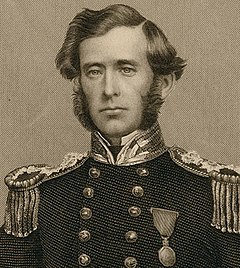Sir Leopold McClintock | |
|---|---|
 McClintock c. 1860 | |
| North America and West Indies Station | |
| Commander-in-Chief 27 November 1879 – 7 November 1882 | |
| Preceded by | Sir Edward Inglefield |
| Succeeded by | Sir John Commerell |
| Jamaica Division | |
| Commodore 6 September 1865 – 21 February 1868 | |
| Preceded by | Sir Algernon de Horsey |
| Succeeded by | Sir Augustus Phillimore |
| Personal details | |
| Born | Francis Leopold McClintock 8 July 1819 Dundalk, County Louth, Ireland |
| Died | 17 November 1907 (aged 88) Kensington, London, England |
| Resting place | Hanwell Cemetery |
| Spouse |
Annette Dunlop (m. 1870) |
| Children | John William McClintock |
| Awards | |
| Military service | |
| Allegiance | |
| Branch | |
| Service years | 1835–1884 |
| Rank | Admiral |
| Expeditions | McClintock Arctic expedition |
Sir Francis Leopold McClintock KCB FRS (8 July 1819 – 17 November 1907) was an Irish explorer in the British Royal Navy, known for his discoveries in the Canadian Arctic Archipelago. He confirmed explorer John Rae's controversial report gathered from Inuit sources on the fate of Franklin's lost expedition, the ill-fated Royal Navy undertaking commanded by Sir John Franklin in 1845 attempting to be the first to traverse the Northwest Passage.
McClintock's report was received more favorably than that of Rae, who was shunned and denied recognition for having discovered the lost expedition's fate. Rae's report ultimately guided McClintock to the correct area to conduct a search. McClintock also stirred controversy with his claim that Franklin, before his death, had essentially discovered the Northwest Passage, while in reality he had not. Rae, with his discovery of Rae Strait, had discovered the real ice-free passage through North America's Arctic archipelago.